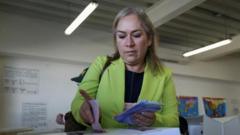In a landmark election, Silvia Delgado, who represented drug lord El Chapo, has been elected as a local criminal judge in Ciudad Juárez, raising eyebrows over her past connections. Despite claims of ties to organized crime, Delgado emphasized her right to represent clients in court.
Ex-Lawyer for 'El Chapo' Makes History as Judge in Controversial Election

Ex-Lawyer for 'El Chapo' Makes History as Judge in Controversial Election
Silvia Delgado, former defense attorney for drug lord Joaquín "El Chapo" Guzmán, secures a judicial position amidst allegations and a low voter turnout in Mexico's groundbreaking elections.
In a historic development that has sparked significant debate, Silvia Delgado, a former defense lawyer for the infamous drug lord Joaquín "El Chapo" Guzmán, has been elected as a local criminal judge in Ciudad Juárez, Mexico. Preliminary voting results released on Tuesday indicated Delgado received sufficient support to secure her position in the country's first-ever judicial elections.
Delgado's candidacy was mired in controversy, with accusations from a prominent transparency group alleging she had links to organized crime. The 51-year-old lawyer, however, vehemently dismissed such claims, insisting that her role in defending El Chapo was purely professional. She was part of the legal team for the Sinaloa cartel leader before his extradition to the United States in 2017. Guzmán was convicted of drug trafficking in 2019 and is currently serving a life sentence in a supermax prison in Colorado.
Interviewed prior to the election, Delgado maintained that every individual, including notorious figures like El Chapo, has the right to legal representation. She further argued that her past should not preclude her from serving as a judge.
Following the announcement of her electoral victory, Delgado chose not to comment further until her position is officially confirmed. The election, held on June 1, represents a significant reform by the governing Morena party, pushing for a more democratic judicial system by allowing citizens to directly elect judges and justices. Proponents laud this initiative as a means of enhancing accountability, yet critics fear it could compromise judicial independence.
Despite the election’s historic significance, turnout was disappointingly low, reaching just 13%—the lowest for any federal vote in Mexico—reflecting a lack of enthusiasm among the populace regarding the direct election of judges. Nevertheless, President Claudia Sheinbaum hailed the election as a significant milestone for the judiciary.






















